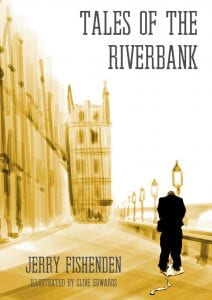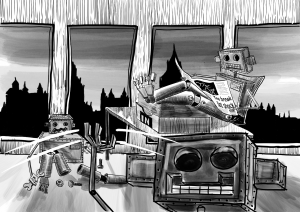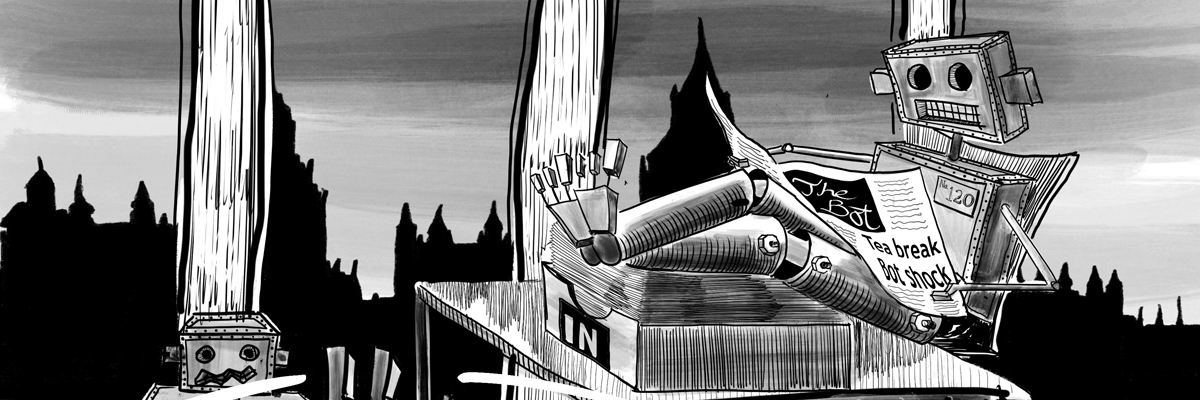 Jerry Fishenden (BSc, Music, 1984, and MPhil in The Design of a Computer-Assisted Composition System, 1996) isn’t one to mince his words when talking about politics and technology, both of which he’s had close contact with during much of his career. His new book of fiction, Tales of the Riverbank, is a collection of interweaving short stories from around Whitehall and Westminster — the heart of UK government.
Jerry Fishenden (BSc, Music, 1984, and MPhil in The Design of a Computer-Assisted Composition System, 1996) isn’t one to mince his words when talking about politics and technology, both of which he’s had close contact with during much of his career. His new book of fiction, Tales of the Riverbank, is a collection of interweaving short stories from around Whitehall and Westminster — the heart of UK government.
“Even if readers may find much of the book unbelievable or exaggerated, believe me, it’s not. I’ve left out many other stories that I could have included. They were simply too unbelievable. Perhaps they’ll find their way into a sequel …” Jerry Fishenden, a double City alumnus, teases.
“I wanted to capture an authentic but heightened sense of what it’s been like working inside government and with technology, the often bizarre situations and characters you encounter, but in an amusing, engaging, and human way. I’ve endured many meetings, far too many in fact, that’ve made me question the true motivations of the people running them, their lack of focus and urgency, why they take so long to achieve so little, and why many in positions of power still seem almost proud of their loudly self-professed ignorance of technology and how it works, often neglecting the needs of the citizens they’re supposedly there to serve.”
Although the stories in Tales of the Riverbank draw extensively on Jerry’s own experiences, he does point out that they’re fiction, and he’s allowed himself to be inspired by some of his own favourite writers.
“I’m a big fan of Charles Dickens and the way he captured a human sense of the world around him. Chaucer’s Canterbury Tales, with its rich cast of characters narrating their stories in The Tabard, was also an inspiration, so much so that my original working title was The Westminster Tales,” Jerry says.
“The novel’s my own small, imperfect way of trying to do something similar, although instead of being based in a pub, it’s largely set in the even more dysfunctional institutions of Westminster and Whitehall.”
 The 35 stories in the book are all accompanied by detailed and imaginative illustrations created by Jerry’s fellow City alumnus Clive Edwards (BSc, Music, 1984).
The 35 stories in the book are all accompanied by detailed and imaginative illustrations created by Jerry’s fellow City alumnus Clive Edwards (BSc, Music, 1984).
“Despite knowing Clive since I did my BSc far back in the mists of time, it was only recently I discovered his amazing talent for drawing and caricature. His illustrations really help make the book,” Jerry says and continues to explain why he decided to include images.
“I’ve always enjoyed illustrated books, fact and fiction, and wanted to capture the look and feel of some of my favourite and fun books from childhood, books that were illustrated with wacky and irreverent images, or the dark menace of illustrated fairy tales by the likes of the Brothers Grimm.
Jerry Fishenden studied Music at City, with an emphasis on technology.
“The university provided a great opportunity to explore my interests at the intersection of music and technology, particularly computing, in a way that wasn’t possible anywhere else at the time. This included developing artificial intelligence techniques for music composition,” Jerry says.
“My studies at City helped me to develop skills across science, technology, and the arts, as well as good communication, a combination which has proved invaluable in the workplace.”
His skillset and career path have taken him to places few others are privy to.
“My studies helped inform my engagement with governments, who with the exception of a few politicians, are often decades behind where they need to be in terms of ensuring technology is used for societal good and improvement, and use it instead to undermine democracy and transparency, either by design or through incompetence as a result of listening uncritically to those driving the wrong agenda.”

In the past year, not only governments have had to deal with unfamiliar technology, most of us, have been required to spend more hours in front of a screen than we are used to. “Welcome to my world!” Jerry greets us.
“I’ve worked remotely and flexibly for decades, and the technology still stinks, lagging way behind where it should be by now. It captures little if any of the integral and essential social aspects of the workplace, particularly the important work that often happens informally on the edges of face-to-face meetings, the social interactions with colleagues, chatting over tea and biscuits in a canteen or cafe during a break, or over an after-work drink.”
He gives us the following advice:
“It’s important not to let the poor technology dominate, it can be very draining and soulless. I find turning off the video and only using audio helps, particularly on more intensive days. Also, taking frequent breaks and getting away from the screen. Brief walks in fresh air, even if it is only a brisk walk around the block. And listening to music between meetings while writing, or responding to emails, and so on. But most importantly of all, it’s refreshing to get some face-to-face time with friends, even if for now it’s while wearing a mask or at an anti-social distance.”
Speaking of music, the subject of Jerry’s two degrees at City, what is his preferred way of enjoying it?
“Live music is ideal, particularly in the right setting, which for me is a small, intimate venue or club,” he says. “At home, I like putting on a record or CD, there’s something about the tactile nature of the experience, and the sound quality, I still enjoy. I also enjoy streaming services for the convenience and sheer range and diversity of music they open up at the press of a button, but the audio quality is usually poor, well below what we should expect.”
And as an avid reader and writer, what are his preferences?
“With books, I find I mainly read factual eBooks, partly because they’re easier to search to find quotes to use in my research, but I still buy paperbacks when it comes to fiction. After a day of ceaseless video conferencing torture, what better way to relax and feel human again than to put on some music, settle down with a good book, and enjoy a suitable drink?”
A big thank you to Jerry Fishenden for sharing his thoughts on his recently published book Tales of the Riverbank, and the state of our technology and politics.
Jerry’s book can be found here. His blog new tech observations from the UK (ntouk) can be found here, and he is also on Twitter as @ntouk .
